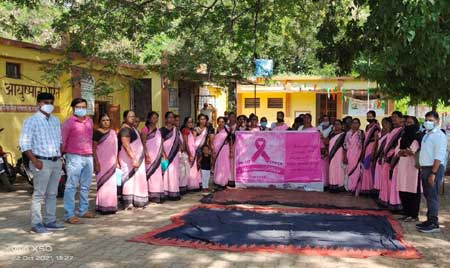Breast Cancer Awareness Month: October, 2021
In India, breast cancer is the leading cause of cancer in women
 |
Breast cancer occurs in every country of the world in women at any age after puberty, but with increasing rates in later life. In India, breast cancer is the leading cause of cancer in women.
The good news is that breast cancer is not a transmissible or infectious disease and it can be treated if detected early. Certain factors that increase the risk of breast cancer include increasing age, obesity, family history of breast cancer, certain inherited genes, early menarche, late menopause, first child birth after the age of 30, having never been pregnant, use of alcohol and exposure to radiation treatment.
It is therefore important to be aware of the changes in your breasts and to know the signs and symptoms of breast cancer. The information given below will assist you to detect the early signs and symptoms of breast cancer and the way forward:
1) Early signs and symptoms of breast cancer include:
- - A breast or thickening in the breast that feels different from the surrounding tissue
- - Change in the size, shape or appearance of a breast
- - Nipple turning inward
- - Nipple or breast skin that is red, dry, flaking or thickened
- - Nipple discharge other than breast milk, including blood
- - Redness or pitting of the skin over your breast, like the skin of an orange
2) Early detection and screening includes:
- - Breast self-examination to be done monthly by the woman, best time being just after the end of her periods to notice any irregularity, any lumps, etc.
- - Clinical breast examination to be performed annually by a doctor who studies the person's history and performs a body checkup including breast examination with an aim to detect any suspicious abnormality
- - Annual mammography for women starting at the age of 40
3) Behavioural choices that can reduce the risk of breast cancer:
- - Healthy weight: People who have obesity, compared to those with a healthy weight, are at increased risk for many serious diseases including breast cancer. Postmenopausal women who are obese have a 20% to 40% increase in risk of developing breast cancer compared with normal-weight women.
- - Regular physical activity: Regular physical activity is important for good health and for losing weight or to maintain a healthy weight. It also reduces risk for type 2 diabetes, heart attack, stroke, and several forms of cancer. To maintain a healthy weight, it is essential to do 150 minutes of moderate-intensity aerobic activity, 75 minutes of vigorous-intensity aerobic activity, or an equivalent mix of the two each week.
- - Breast feeding: Breast feeding lowers a mother's risk of breast cancer. One reason may be that when a woman is breastfeeding, she experiences hormonal changes that may delay the return of her menstrual periods. This reduces her lifetime exposure to hormones such as estrogen, which are linked to an increased risk of breast cancer. For every 12 months a woman breastfeeds, her risk of breast cancer decreases by 4.3% (Ref: Lancet .2002 Jul 20;360(9328):187-95. Collaborative Group on Hormonal Factors in Breast Cancer Study).
- - Avoiding the use of alcohol: All types of alcoholic drinks are linked with cancer. The more one drinks, the higher the risk of cancer. When alcohol is consumed, it is broken down in the body into a chemical called acetaldehyde. Acetaldehyde damages the DNA and this results in inability of the body to repair the damage. Thus when DNA is damaged, a cell can begin to grow out of control and can result in cancer.
- - Post-menopausal hormone therapy: Women who take a combination of estrogen and progestin are more likely to be diagnosed with breast cancer. The risk of breast cancer is greater when women take the combined hormone therapy for a longer period, but it decreases markedly when hormone is stopped.
4) Treatment for breast cancer includes one or a combination of:
- - Surgery - the removal of the tumor and some surrounding healthy tissue for small tumours (lumpectomy) and removal of the entire breast for larger tumours (mastectomy)
- - Chemotherapy using anti-cancer drugs to destroy cancer cells
- - Radiation therapy using high energy rays that destroy cancer cells
- - Hormone therapy - to treat breast cancers that are sensitive to hormones (estrogen receptor positive and progesterone receptor positive cancers)
- - Targeted Drug Therapy is a treatment that targets the cancer's specific genes and proteins that contributes to cancer growth.